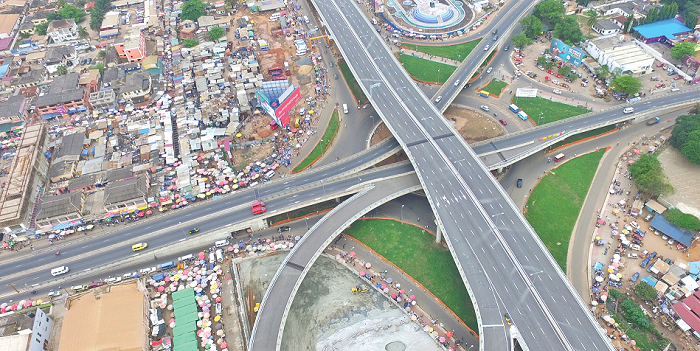
Kwame Nkrumah Interchange opens today
The Kwame Nkrumah Interchange will be fully opened to traffic today. To officially open the interchange, the Brazilian construction firm, Quieiroz Galvao, will hand over the project to the government this morning.
The project, funded with a loan from the Brazilian government, is expected to ease traffic, reduce travel time for commuters and vehicle operating cost to stimulate local economic growth.
The construction of the interchange became necessary following constant heavy traffic at the Kwame Nkrumah Circle, which handled over 84,000 vehicles from the arterial roads and their intersections daily.
The project involves detailed engineering and construction of the old circle into a three-tier interchange and other ancillary works, including drainage, terminals, pedestrian walkways, landscaping, among other things.
It also includes a 1.2-kilometre flyover from the Busy Internet end of the Ring Road to the Awudome Cemetery, near the Obetsebi-Lamptey Roundabout, with lane markings and street lights.
There are also down pipe drains that will take water from the top to the drains and to the main gutters and service roads.
Other aspects
As of the end of last week, workers were seen putting final touches to the landscaping. A Ghana National Fire Service station and an ambulance station had been ready since September 2014.
Two main terminals have also been constructed at the former Odawna Lorry Station and the Neoplan Station, with offices for the Ghana Private Road Transport Union (GPRTU).
There is also a fountain, popularly known as the Kwame Nkrumah Fountain, and a statue of Ghana’s first President, Dr Kwame Nkrumah, at the place.
Delays
Although the contractors were supposed to have handed over the project to the consultants by the end of September 2016, the deadline was extended to the first week of October and that too was reviewed due to technical challenges.
The Assistant Chief Resident Engineer, Mr Philip K. Ansah, told the Daily Graphic that the recent rains slowed down the work.
He said the contractors had finished their portion in September but there had been a challenge.
“When it rained for a day, it took a week or more for work to resume”, he added.
Mr Ansah said the change in the time schedule did not have any financial implications, as the contract sum was a fixed one.
